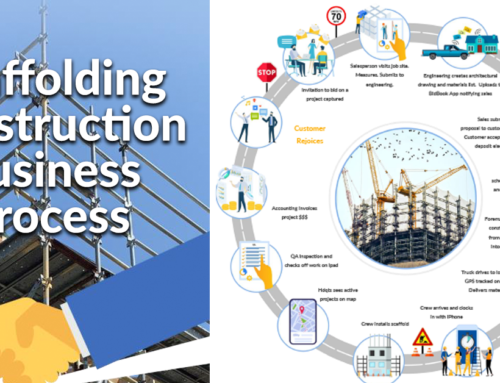Construction management is not as easy and organized as it sounds. Especially in this industry, almost everything is easier said than done.
It only takes a minute or two to say you’ll respond to an invitation to bid but it takes a lot of actual work to finally come up with a bid proposal. Not to mention the considerations that go with it.
With a pre-construction and estimating team to coordinate with, bid plans to prepare, and consultants to discuss with, a construction management software would be the solution of the majority.
After all, proper construction management—from concept to completion is necessary to make any construction project a success.
#1 You don’t calculate the value of a construction management software.
It’s common in every construction site or office to juggle multiple organization tools at a time. Has no one ever really noticed the switching of screens multiple times while presenting at a meeting just to analyze data and make a point? Saying that you value a construction project management tool is one thing but calculating the overall value it brings to your business is another.
It will surely make a difference if you don’t only focus on what a construction management tool can do. Rather, focus on the idea of using it to maximize the potential of your team. Calculating the value of a construction management tool would be a lot easier if you do it alongside calculating your ROI (return on investment) from it.
#2 You don’t work closely with key departments.
Close coordination is critical to your success. Every department in every construction organization is equally important. If you don’t work together, there’ll be no project to work on in the first place.
Managing your outgoing and incoming bid software for example, isn’t just a task of a single department. There’s one to evaluate, one to verify, one to confirm, one to implement, etc. If the key departments don’t act on their respective tasks, it just leaves a department hanging one after another. Surely, it’s going to have a detrimental effect on the progress of the project.
#3 You don’t budget realistically.
At one point, you get so optimistic that you can pull off a project within a certain budget range only to be overwhelmed by the ballooning overhead expenses in the long run.
Construction management mistakes are easiest to identify when project expenses start to exceed the allocated budget. While various factors can cause such, bid management always seems to be a critical part of the equation. At times when the volume of bids received and sent out is high, some important bid proposal items are sometimes overlooked. This is almost always the case not just with poor bid management but also with overall construction management.
#4 You don’t organize customer data.
It is a fact that underlying customer data is the backbone of every construction organization. However, storing everything including duplicate and outdated data in multiple locations can heavily slow down a team altogether.
Sorting updated data in a unified database and making it available and easily accessible to your entire organization will guarantee smooth business processes moving forward. This makes it easier for you to go over bid addendum, proposals, contracts, and plans, among others.
#5 You don’t lead the project from the top down.
Experts agree that the No. 1 reason proper construction management doesn’t work is that senior executives fail to lead. After all, if managers don’t work hard to ensure order between key departments in the organization, why should the rest follow suit?
As someone who works with a higher level of authority in a construction organization, it is important to know the difference between simply telling people to implement systems and doing it as standard procedure.
#6 You don’t invest time looking for specific solutions.
Even the most renowned construction organizations are guilty of resolving issues temporarily with band-aid solutions only. While some work for quite a period, it should be noted that not everything lasts when addressed with temporary solutions.
This is especially applicable to work systems and processes within the organization. If construction management practices are not established as long-term solutions, this needs to change.
Band-aid solutions aren’t worth it anymore when your business loses the chance to win a project just because you missed sending out a bid proposal on the given financial bid submission date. Who knows, it could be worse.
#7 Are you thinking large but starting small? Over-ambition vs superficial.
Any major change in the workflow in your construction organization is going to overwhelm you and your team at some point. If you want to iron out your business processes and practices, don’t fear taking small steps toward your construction management goals. This means you must take accountability for your actions and make sure you reap the results you intend to achieve.
This is especially true within the respective key departments. While it may not be easy to change processes and systems that a construction team has long been used to, starting somewhere is key. Perhaps having a systematic approach to managing bids from specialty contractors and general contractors is a good start.
#8 You don’t believe your team can adopt to change.
“Old habits die hard” is applicable in construction. Old habits in contract, plans, specifications, and bid management to name a few, die hard. However, it only remains true if you don’t believe your construction organization is capable of change.
You have to remember that for you and your team to embrace the proper way of doing construction management, you will have to implement and use the solutions you have. This can be done in the form of training, inquiries, and live demo. This way, you’ll chip away faster at the 18 to 24 months it typically takes for a construction organization to adopt improved business processes.
#9 You don’t give a period for adjustment.
Just like anything new, the experience will be different at first. If your new construction management plan entails new systems and solutions, resistance will be a natural response.
This is where most construction organizations get stuck. Most easily give up and eventually abandon progress halfway, which should not be the case. Anything new will always need room for adjustment and any concern just needs a quick resolution for easy retention.
#10 You don’t think you can change the business culture.
Work in a construction setting is ever changing. One day you’re invited to bid for a single project, the next day you’ll find your team working on bids for multiple projects. If these are quick to change, what makes you think your business culture can’t?
If your goal is to make your construction management plan work for your business, the development of a culture of continuous improvement should start with you. Increased levels of engagement and communication with your team should be centered on the goal of improving the overall construction management in your organization.
It’s easy to spot mistakes when they’re noticeable but mistakes in construction management such as those listed above are difficult to recognize especially when it has been the norm for quite some time.
Not all construction organizations will succeed in implementing a reliable construction management system as many will fail to move passed a mistake or two. Fortunately, there’s a construction management software that can help you get started in re-evaluating your construction business processes.
It’s already a feat to overcome a single construction management mistake. What more overcoming all those listed and ending up scaling business operations and increasing your revenue?
BidBook is more than just a bid management software built on the No. 1 CRM platform, Salesforce.






